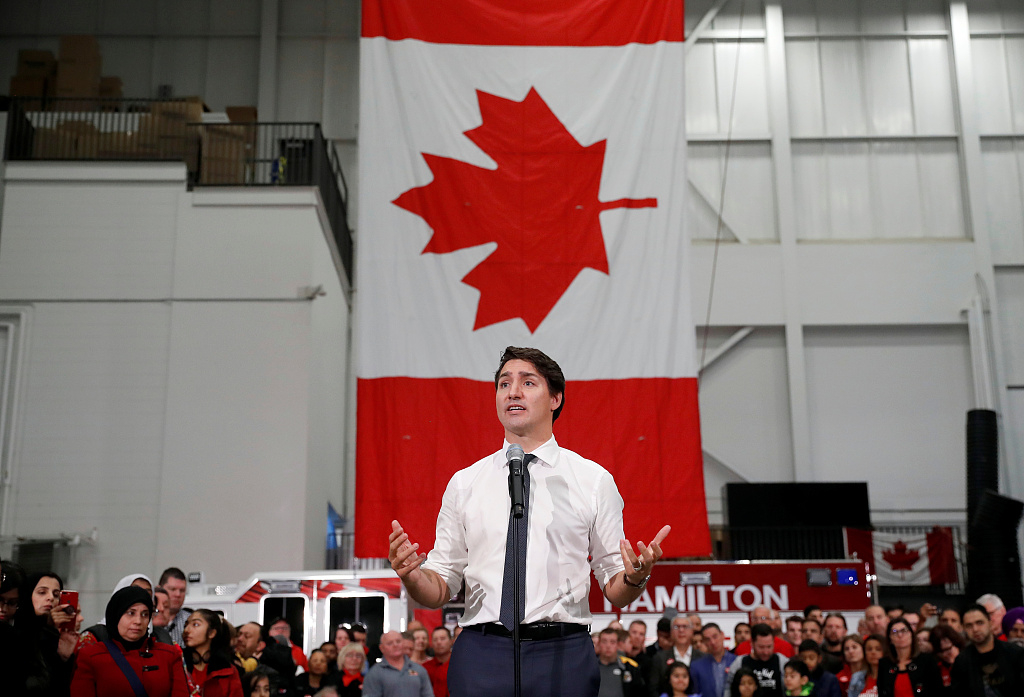Editor's note: Andrew Korybko is a Moscow-based American political analyst. The article reflects the author's opinions, and not necessarily the views of CGTN.
Canadians vote in parliamentary elections on October 21 in a race that's much too close to call between Liberal incumbent Justin Trudeau and his Conservative challenger Andrew Sheer. It wasn't supposed to be this way, though, since the race was originally Trudeau's to lose. He's the son of beloved former Canadian Prime Minister Pierre Trudeau and was therefore immensely popular upon entering the office.
It also helped that his term has been characterized by a comparatively stable economy that reduced the unemployment rate, granted tax cuts to the middle class, and saw Canada renegotiating North American Free Trade Agreement. Although Trudeau's unapologetic social liberalism has earned him his fair share of enemies, it was thought that he'd be a shoo-in for a second term in office until the SNC-Lavalin affair exploded earlier this year.
The Prime Minister was accused of pressuring former Attorney General Jody Wilson-Raybould, Canada's first indigenous woman to hold that position, to drop charges against the Quebec-based engineering company for allegedly bribing Gaddafi-era officials in Libya. He denied that he had done any such thing and defended his actions as being intended to save Quebecois jobs, which just so happen to be in a crucial electoral battleground province where his party is narrowly leading according to the latest polls but is being seriously challenged by the upstart Bloc Québécois.
That scandal didn't dent his popularity too much even though it raised questions about the sincerity of his liberal image, but it was the latest revelations last month that he had worn blackface on at least three occasions that voters became concerned.
The pictures of Trudeau in blackface completely contradicted his reputation as an anti-racist committed to protecting the sensitivities of his country's many ethno-religious minorities, something that his Conservative opponent Sheer was all too happy to exploit, to portray him as the consummate hypocrite whose poor sense of judgment should disqualify him from a second term.
Sheer isn't immune to controversy either, though, since it was recently revealed that he's actually a dual American citizen due to his father (the children of American citizens are automatically regarded by the country as having citizenship no matter where in the world they're born) and even registered for the selective service. He's in the process of renouncing his citizenship, but some Canadians might still feel uncomfortable that he only waited until now to do so.

Liberal leader and Canadian Prime Minister Justin Trudeau campaigns for the upcoming election in the Hamilton Fire Department in Hamilton, Ontario, Canada, October 19, 2019. /VCG Photo
Liberal leader and Canadian Prime Minister Justin Trudeau campaigns for the upcoming election in the Hamilton Fire Department in Hamilton, Ontario, Canada, October 19, 2019. /VCG Photo
According to data shared by the BBC on October 17, the top five issues for Canadians are healthcare, climate change, cost of living, taxes, and economy, so pretty much the main issues in most other developed economies elsewhere across the world.
Trudeau's economic record might not be enough for him to win, though, since the scandals that plagued his premiership during the last year could lead to some Liberals either staying home or voting for other parties, which might dilute his support at the polls and push the Conservatives to first place. They have some different approaches toward these issues, such as Scheer being in favor of eliminating the carbon tax that Trudeau implemented, but they're not so fundamentally different from one another as to say that Canada is facing a historic choice.
Whoever ends up winning will have to skillfully manage Canada's relations with the U.S. and China, the first-mentioned of which has historically acted as a bullying big brother while the second has been victimized by unprovoked "lawfare" aggression from Ottawa after law enforcement officers arrested Huawei's chief financial officer Meng Wanzhou late last year in what objective observers believe was a spineless display of fealty to Donald Trump during a high point of tension during the trade war.
Although Scheer has been critical of China on previous occasions, he said that Canada needs a "reset" in relations with the People's Republic of China, though it's unclear at this point in time whether that's just campaign-style rhetoric to position himself as Trudeau's foil or if he sincerely plans to do something of the sort if he wins.
At this point, it's way too hard to tell whether Trudeau will receive a second term or not, but many commentators are quipping that neither he nor Scheer will probably win a majority, so the tradition of a minority government will probably continue unless the incumbent loses and attempts to form a coalition government with the National Democratic Party like some people have been speculating after the latter's leader dropped hints of this scenario (which he later tried to walk back), even though it only happened once before in 1917. It'll, therefore, be interesting for the rest of the world to see what happens and if liberal Trudeau becomes the latest victim of the populist-conservative zeitgeist that's been sweeping the Western world over the past couple of years.
(If you want to contribute and have specific expertise, please contact us at opinions@cgtn.com.)